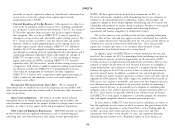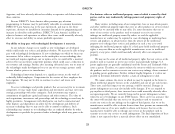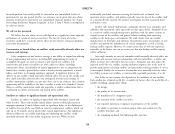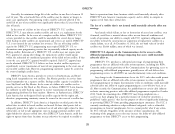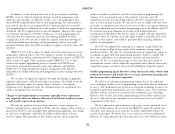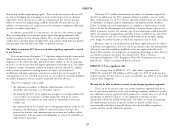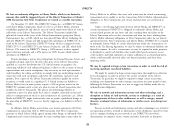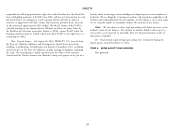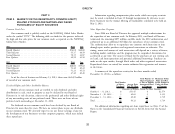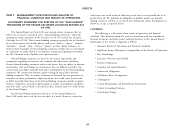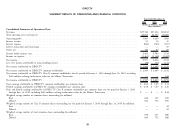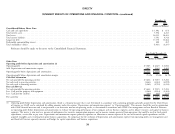DIRECTV 2012 Annual Report Download - page 46
Download and view the complete annual report
Please find page 46 of the 2012 DIRECTV annual report below. You can navigate through the pages in the report by either clicking on the pages listed below, or by using the keyword search tool below to find specific information within the annual report.DIRECTV
In addition, certain cable providers have in the past denied us and other number of markets in which we can deliver local broadcast programming will
MVPDs access to a limited number of channels created by programmers with continue to be constrained because of the statutory ‘‘carry-one, carry-all’’
which the cable providers are affiliated. In other cases, such programmers have requirement and may be reduced depending on the FCC’s interpretation of its
denied MVPDs high-definition feeds of such programming. The cable providers rules, as well as judicial decisions. We may not be able to comply with these must
have asserted that they are not required by the Communications Act to provide carry rules, or compliance may mean that we are not able to use capacity otherwise
such programming (or resolution) due to the manner in which that programming is for new or additional local or national programming services. In addition, the FCC
distributed. The FCC adopted rules to close this loophole. However, they require has issued an increasing obligation for carriage of local digital broadcast
an evidentiary showing by an MVPD seeking access to such programming and transmissions in HD format. We may be unable to comply with this requirement
cable operators have vigorously contested such showings proffered by other in markets where we currently carry such signals without ceasing HD local service
complainants. If we were not able to make the required evidentiary showing, we entirely in some markets, and would be precluded from launching additional
could be precluded from obtaining such programming, which in turn could markets currently planned.
materially adversely affect our ability to compete in regions serviced by those cable The FCC has adopted rules requiring us to negotiate in good faith with
providers. broadcast stations seeking carriage outside of the mandatory carriage regime
DIRECTV U.S. itself is subject to similar restrictions with respect to certain described elsewhere. The rules for ‘‘retransmission consent’’ negotiations require us
programmers affiliated with us. The FCC imposed a number of conditions on its to negotiate in good faith with programming providers. Failure to comply with
approval of Liberty Media’s acquisition of News Corporation’s interest in DIRECTV these rules could subject us to administrative sanctions and other penalties.
which continue to apply. Those conditions require DIRECTV U.S. to offer Moreover, the FCC is considering changes to these and other rules related to
national and regional programming services it controls to all MVPDs on retransmission consent, which could make negotiations more difficult, increase fees
non-exclusive and non-discriminatory terms and conditions, and prohibits charged for carriage, or result in the increased withholding of broadcast signals.
DIRECTV U.S. from entering into exclusive arrangements with affiliated
programmers or unduly influencing such programmers in their dealings with other Satellite programming signals have been stolen and may be stolen, which could
MVPDs. result in lost revenues and would cause us to incur incremental operating costs
that do not result in subscriber acquisition.
We are subject to significant regulatory oversight and changes in applicable
regulatory requirements could adversely affect our business. You should review the The delivery of subscription programming requires the use of conditional
regulatory disclosures under the caption ‘‘Item 1—Business—Government access technology to limit access to programming to only those who are authorized
Regulation—FCC Regulation Under the Communications Act and Related Acts’’ to view it. The conditional access system uses encryption technology to protect the
which is incorporated here by reference. transmitted signal from unauthorized access. It is illegal to create, sell or otherwise
distribute software or devices to circumvent that conditional access technology.
Changes to and implementation of statutory copyright license requirements However, theft of cable and satellite programming has been widely reported, and
may negatively affect our ability to deliver local and distant broadcast stations, the access cards used in our conditional access system have been, and could be
as well as other aspects of our business. compromised in the future.
We carry the signals of local and distant broadcast stations pursuant to We have undertaken various initiatives with respect to our conditional access
statutory copyright licenses contained in SHVA, and our carriage of these stations is system to further enhance the security of the DIRECTV signal. We provide our
governed by the FCC and Copyright Office implementing regulations. Any changes subscribers with advanced access cards that we believe significantly enhance the
to such laws or regulations could limit our ability to deliver local or distant security of our signal. We believe these access cards have not been compromised.
broadcast signals. More generally, we have limited capacity, and the projected However, we cannot guarantee that these advanced access cards will prevent future
26




